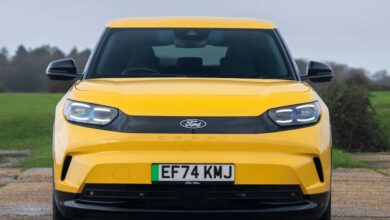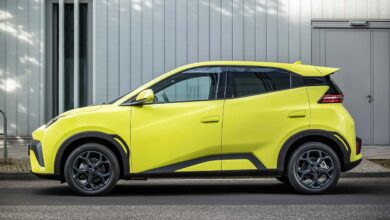Not Every Chinese EV Brand Will Survive. These Died In The Past Year

- China has more than 100 estimated EV brands on its market.
- These are three companies that had full displays at the 2024 Beijing Auto Show.
- More EV brand consolidation is inevitable in China’s market.
I’ve been fortunate to visit China more than once. Yet I’d be remiss if I were merely stunned at the country’s electric-vehicle progress without taking a look back and asking: “Is this all sustainable?”
I’m not talking about the actual cars being sustainable tech; EVs are better for our world compared to ICE or hybrid cars. I’m talking about the business itself. China has a crazy number of EV startups and brands. Even in the year I’ve been traveling there, the country has already lost a few, some of which weren’t small players.
At this year’s Shanghai Auto Show, which trades off every year with the Beijing Auto Show, we saw offerings from nearly all of the country’s estimated 100 brands. As impressive as those cars are, it’s foolish to assume all of them will survive—and already, many aren’t making the cut.

Photo by: Patrick George
2025 Shanghai International Auto Show
Here are three that I saw and interacted with when I was at last year’s Beijing Auto Show, that won’t (or didn’t) make it to the next one.
This started as a promising joint venture between China’s equivalent of Google, called Baidu, and Geely. Yes, Geely had yet another brand focused on tech, but unlike the PoleZeekVolvo & Co brand, Geely simply supplied the car base while Baidu did everything else.
From what I experienced last year, the car’s driver assistance features were impressive. The Ji Yue 01 promised better-than-Tesla, nearly Level 3 autonomous driving for not that much money. It used the same SEA platform as almost every new Geely, Zeekr, Volvo or Lynk & Co EV, albeit not as nice as some of the plusher implementations.

Yet, the car’s technical advancements weren’t enough to get it off the ground. The Ji Yue 01 hatchback struggled to crack more than a few thousand monthly sales. The brand launched a sleek 07 sedan, but it couldn’t lift sales.
In December the crap really hit the fan when angry employees demanded to be paid, while a lead engineer advised existing employees to cut and run and find new jobs as soon as possible, according to reporting from CarNewsChina.
Ji Yue hasn’t officially been declared dead yet, but its stores are closed, and much of the driver assistance features may not work without manufacturer support.
At last year’s Beijing Auto Show, this brand had a fairly large stand. Its biggest news was the launch of the Neta L; a compact EREV for only about $14,000. This was the latest in the brand’s offering of a smattering of EVs and EREVs, including a sleek wagon called the Neta S Hunting. For a while, sales seemed to be promising, and the brand even made inroads into parts of Southeast Asia and MENA with exports and production. The company sold more than 60,000 cars in 2024.

Photo by: Neta
But 2025 has not been good. Neta announced severe layoffs, with some claiming that the company’s entire R&D department is completely gone. The brand still has a presence on social media at least, with most of its posts revolving around Brazil, Indonesia and Thailand. The Thai government gave Neta a $215 million loan back in March, but it’s unclear if this will be enough to keep the company functional, even outside of China. Neta is clearly hinging its future on export markets, but it doesn’t look long for this world.
A brand you’ve probably never heard of, this upscale spinoff of Dayun (also another brand you probably don’t know) was a fixture at last year’s Beijing Auto Show. To be honest, the cars felt a little underdeveloped with generic designs and not-so-good (albeit flashy) interiors.
Like Neta, Yuanhang dished out all kinds of layoffs and struggled to sell more than a few hundred units per month in China. Yuanhang hasn’t officially closed, but unless it somehow turns things around, it’ll be pretty dead too.

Photo by: Yuanhang
Keep in mind that these are just three brands that I knew had active stands at the Beijing Auto Show. Other brands like HiPhi, Aiways or Evergrande Auto also bit the dust last year, albeit well before the show.
China has a lot of great EVs and EV brands, but there’s no way in hell it can support so many brands doing the same thing. Even with government subsidies and more than a billion potential customers, these numbers aren’t sustainable.
As time marches onward, the market will only continue to consolidate. Soon, I wouldn’t be surprised if some of China’s larger EV makers drop out or join forces, especially if export markets remain somewhat hostile to imported EVs from China.
Still, that’s a lot of IP that might just go into the garbage. Maybe some enterprising European or American startup could buy it up and make their own EVs here at home. Sort of like Amazon dropshipping, but for cars.
And from what we’ve seen and driven over there, that may not be such a crazy idea.
Contact the author: Kevin.Williams@InsideEVs.com


